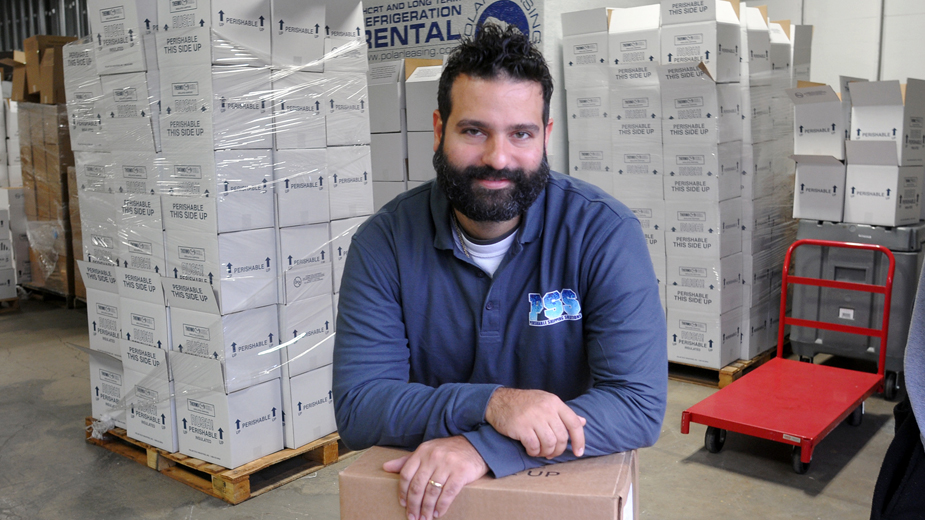Lack of Warehouse Space Is Investment Opportunity
YOUNGSTOWN, Ohio — Business at Perishable Shipping Solutions is up three times over 2018, and the co-founder and operating officer, Danny Catullo, says he’ll be looking to expand soon. The question is whether there is someplace where he can expand.
From its warehouse on Performance Place, Perishable Shipping Solutions provides storage and shipping services to more than 100 companies throughout the United States that sell their products via e-commerce, up from some 50 in November 2017. For smaller direct-to-consumer distributors, partnering with a company such as Perishable Shipping Solutions makes economic sense.
“They might be a three- or five-person team and they’re focused on marketing and selling,” Catullo says. “There’s full-line distributors like [Global Freight Solutions] and US Foods Inc., but when it comes to doing small-batch business-to-business, small stores who are independent don’t have those kind of relationships. This is the only way they can get those products out.”
Shipping out of Youngstown makes good logistical sense as well, Catullo says. Large warehouse space is more affordable in this area and the proximity to major cities such as Cleveland, Columbus, Pittsburgh, Baltimore and Chicago makes direct-to-consumer shipping manageable.
“We can reach 68.3% of the country from Youngstown in two days using FedEx,” Catullo says. “Let’s say you’re located in Boston or New York City and you’re doing your own shipping to the entire country. By moving your business to Youngstown, it will allow you to save about 40% on your shipping costs.”
Last year, Perishable Shipping Solutions bought a 30,000-square-foot distribution center in Reno, Nev., increasing its two-day reach to 92% of the U.S. population, the sweet spot for the industry. As business increases, the company looks to expand again in both locations, he says. While there is enough traditional warehousing and property available in the region, “When it comes to cold storage, that’s going to need to be built,” he says.
New Castle Cold Storage in New Castle, Pa., could be looking to expand its space, says owner, Adam Johnston. Currently, its 2.5 million cubic feet of space is nearly at capacity. But while the market is up for now, Johnston hesitates to pull the trigger on expansion, he says.
“If I really wanted to, I could have something up by the end of the year,” he says. “It would take the right kind of guarantee from one of my larger accounts to make sure I could meet their demand and have a strong feeling that it would go far enough into the future.”
Expansion can mean millions in investment with everything that needs to be done for cold storage, he says. And while 10 years ago the company was looking to increase space, he hasn’t seen the growth with his current clientele to warrant an expansion.
“[In] other businesses, you can do sales to drum up more business,” he says. “But when people aren’t storing, they just aren’t storing. Our main strong point for our business is servicing the accounts we have.”
Still, as more consumers embrace online shopping, National Real Estate Investor reports more cold storage warehouse space will be needed. Cold storage inventory in the United States totals about 3.6 billion cubic feet. Online grocery sales are projected to increase to $100 billion by 2024, up from $19 billion in 2017, NREI reports.
Butter Maid Bakery in Boardman is one company looking to potentially acquire additional space. The bakery ships to all 50 states including Alaska and Hawaii, and ships through Perishable Shipping Solutions on an “as-needed basis,” says owner Jeff Naumoff.
Online sales have gradually increased since 2006 and now make up more than 90% of sales, he says, particularly its 17 varieties of kolachi, which comprise 80% of its sales.
Butter Maid stores products for shipping at its 10,000-square-foot retail space at 425 Boardman-Canfield Road. During busy seasons, such as Easter, space can get tight, Naumoff says.
“As business continues to grow, we’re definitely going to need additional warehousing of all goods,” he says. “We’re not sure where and when that’s going to be yet. … It makes things difficult when you don’t have the square footage to store your dry goods and packaging materials.”
Naumoff sees potential with repurposing big-box retailers that close, although many of the locations are for lease only and he is unsure whether leasing or building new would work best for his business. Overall, there will be a need for additional local warehouse space as more retailers push for quick delivery, he says.
“Every big retailer is trying to figure that out,” he observes.
On the industrial side, demand for spaces between 10,000 and 30,000 square feet is on the rise and creating “good opportunity for developing or repurposing retail space,” says Don Thomas, managing partner at Platz Realty Group. While demand from companies in and outside the region has increased over the last few years, regional inventory “honestly is not good,” he says.
“There’s opportunity in that space for repurposing existing properties and buildings,” Thomas says. Platz has a list of interested buyers, he says, “and we’re not filling those demands.”
In the last three years, nearly a billion square feet of new warehouse space came online, but demand outpaces supply, NREI reports. Absorption hit a record 261 million square feet in 2018 and vacancy dropped to a record low of 4.7%. The gap between demand and supply is expected to continue through this year, according to the trade journal, and markets near transportation and logistics hubs are targeted.
In our region, access to Interstates 80 and 76 and the Ohio Turnpike makes it attractive to distributors and companies that do their own shipping, Thomas says. Easy access to water, rail and highway have caught the attention of such companies, particularly those in trade or small distribution, he says.
And with the TJX HomeGoods distribution center expected to break ground in Lordstown by the end of April, Thomas expects that to amplify the region’s visibility on a national scale.
“I think that is an indicator of some other things that are happening,” he says. “From an overall perspective, that deal is going to get more visibility for the Mahoning Valley. You’re going to see more activity on the industrial side and logistics companies trying to serve West to East.”
But for the area to take advantage of that visibility, there needs to be more development, he says. While working on a transaction with an interested party from Canada, Thomas took its members on a tour of Youngstown, including the downtown area and Youngstown State University.
“I walked them through the city two weeks ago and they were amazed,” he says. “We should tell that story.”
Last year, Platz sold a 15,000-square-foot space in Canfield after the property had been on the market five months, Thomas says. The typical time on market for a similar commercial space can be anywhere from nine months to a year, he notes. “If you can get the price right, it’s going to sell and it’s going to lease.”
And while popular corridors such as Victoria Road in Austintown and McClurg Road in Boardman are filling up quickly, Thomas sees even more opportunity in Salem, Columbiana and the former Delphi spaces in Warren.
“Those are all opportunities,” he says. “There’s a bunch of empty space at Delphi that I think the owners would repurpose. It’s just getting the right folks in there.”
But developers need to get interested, he contends, and the attitudes of some in the area need to change. Some see the Mahoning Valley as having an edge that can turn off businesses from coming into the area. It’s a phenomenon he saw “up close and personal” with the TJX project, he says, citing pushback from Lordstown residents.
“We’re not very embracing of people from outside the area,” Thomas says. “If it wouldn’t have been a company with the fortitude and vision for what they were trying to pull off, they would have left.”
Pictured at top: Danny Catullo, co-founder and operating officer of Perishable Shipping Solutions.
Copyright 2024 The Business Journal, Youngstown, Ohio.



